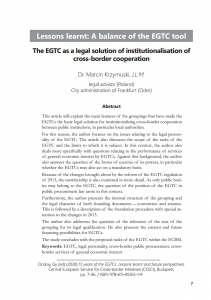European perspective
literature

Information
Author
Marcin Krzymuski
Year of publication
2020
Language
English (EN)
Download
Share
The EGTC as a legal solution of institutionalisation of cross-border cooperation
Abstract
This article will explain the main features of the groupings that have made the EGTCs the basic legal solution for institutionalising cross-border cooperation between public institutions, in particular local authorities. For this reason, the author focuses on the issues relating to the legal personality of the EGTC.
The article also discusses the scope of the tasks of the EGTC and the limits to which it is subject. In this context, the author also deals more specifically with questions relating to the performance of services of general economic interest by EGTCs. Against this background, the author also answers the question of the forms of exercise of its powers, in particular whether the EGTCs may also act on a mandatory basis. Because of the changes brought about by the reform of the EGTC regulation of 2013, the membership is also examined in more detail. As only public bodies may belong to the EGTC, the question of the position of the EGTC in public procurement law arose in this context.
Furthermore, the author presents the internal structure of the grouping and the legal character of both founding documents – convention and statutes. This is followed by a description of the foundation procedure with special attention to the changes in 2013. The author also addresses the question of the relevance of the seat of the grouping for its legal qualification. He also presents the current and future financing possibilities for EGTCs. The study concludes with the proposed tasks of the EGTC within the ECBM.